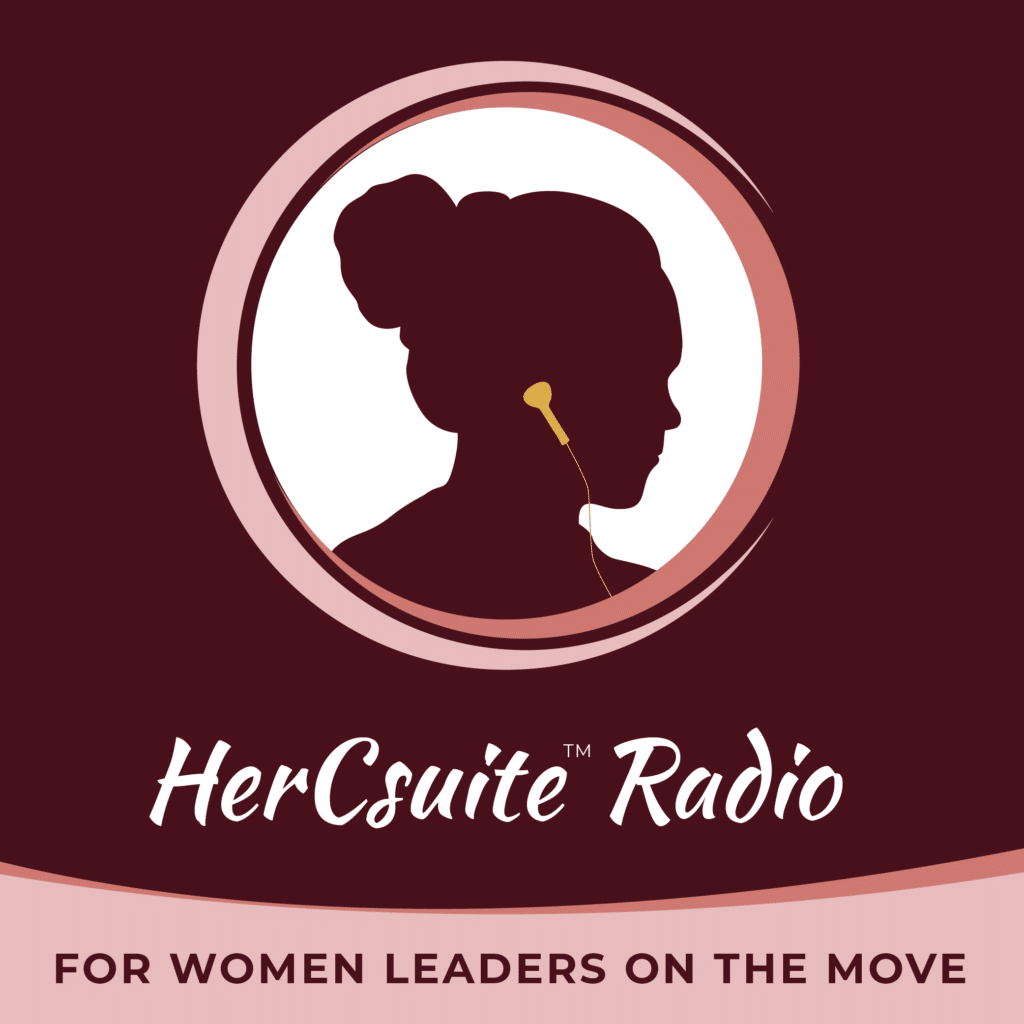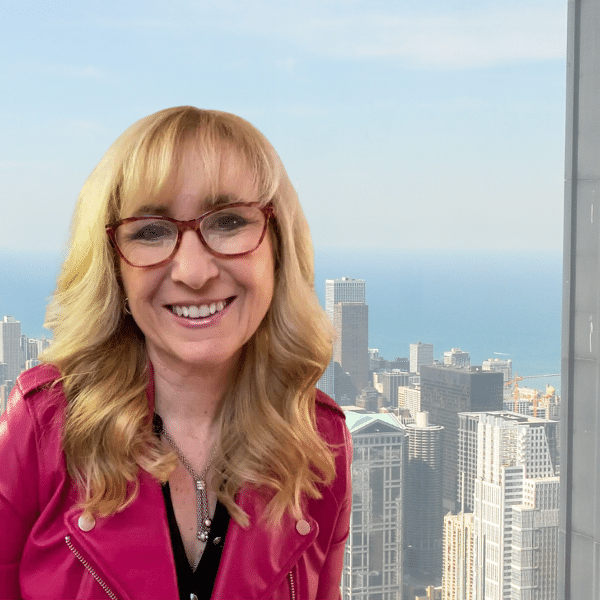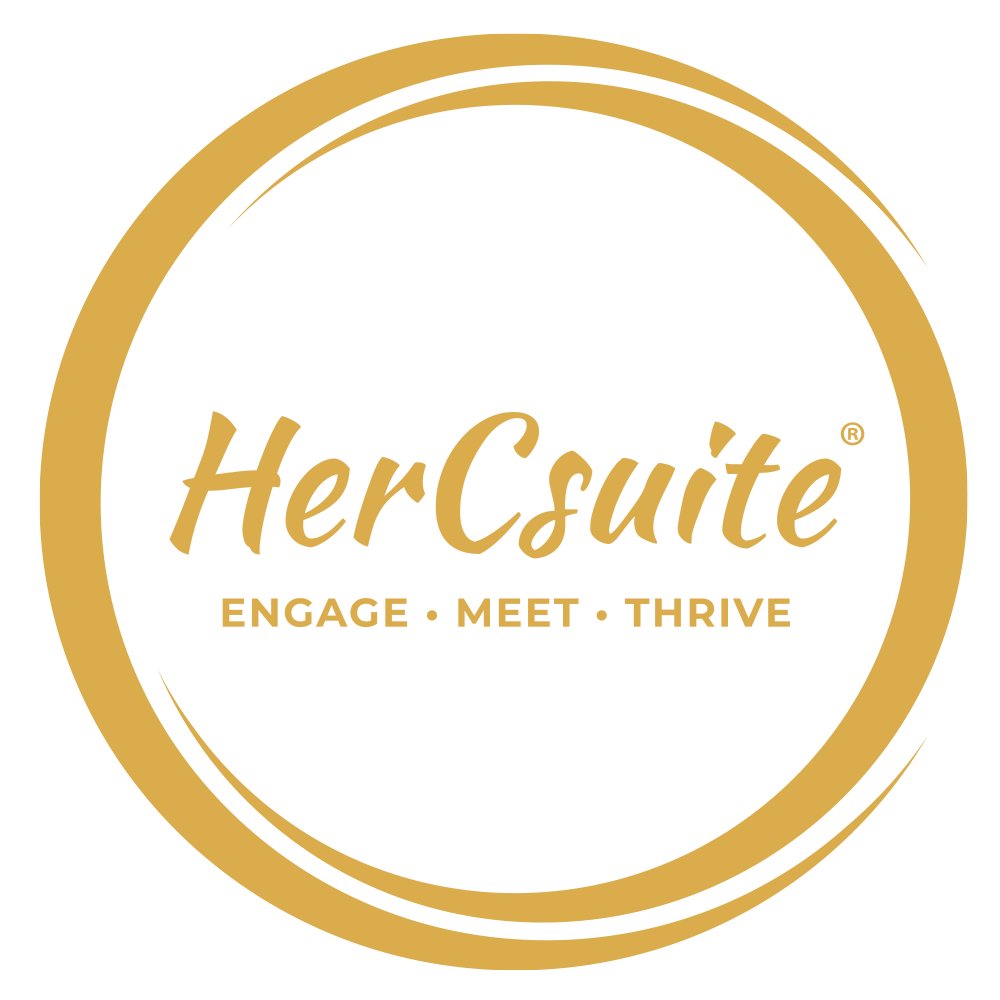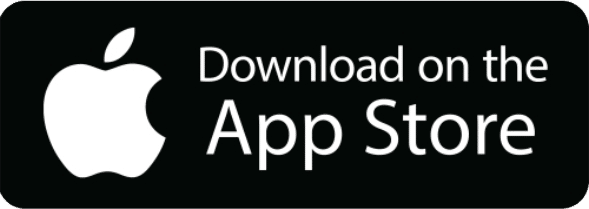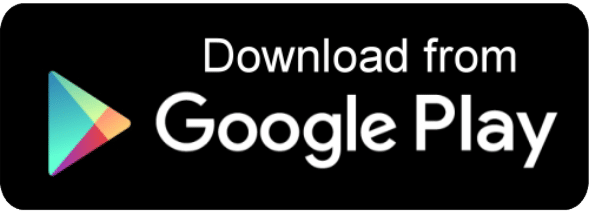We Are Women Who Change History With Dominique Luster
Can you name all four of your grandmothers? How about all eight of your great-grandmothers? It gets more difficult as you move up the family tree, and it’s more challenging with women, whose names are changed in public records.
Wouldn’t it be amazing to know who your fifth grandmother was and the details of her life? Beyond that “amazing” factor, professional researcher, archivist, and storyteller Dominique Luster believes that we can draw strength from the women who came before us just by knowing their names and what they did in their lifetime. Brought up in a family that told stories, Dominique shares her gift to the world by helping people discover the stories of marginalized communities that have been suppressed, oppressed, erased, or forgotten
Hear what it was like for Dominique to learn about her 5th grandmother Charity, who was born enslaved but managed to find her children and create a life with them.
For Dominique, learning about her grandmothers and how we carry a piece of DNA with us from generation to generation has helped her see the world differently. This episode is airing on the first day of Black History month and you will feel mesmerized by the descriptive details in Dominque's stories. Join in the conversation and discover how you, too, can gain such a unique perspective.
Dominique Luster is one part archivist -one part researcher – full parts natural-haired bourbon connoisseur. For nearly ten years, she has worked to help communities uplift, honor, and represent the lived experiences of diverse voices and the Black diaspora.
Resources: Visit HerCsuite™
Find out how you can have Dominque Luster as a featured speaker and Schedule a call to learn more.
HerCsuite™ Founder and Podcast Host Natalie Benamou can be found LinkedIn | HerCsuite™ LinkedIn | HerPower2 LinkedIn
Thank you to Dominique Luster for being on the show and to you for listening to the show and shining your light in the world! We would be honored if you subscribed and shared this episode with a friend or colleague today.
Show Transcript:
Dominique, I'm so excited to welcome you. Thanks for being on the show.
Thank you so much for having me. I'm so grateful to be here.
I had so much fun learning about the work you are doing and I cannot wait for our readers to find out more about you. For those that don't know you, the work you are doing and what brings us here, I would love for you to share the arc of your career and information about you with our readers.
What a great honor and blessing to be here. I'm so excited. This is going to be a great conversation. A little bit about me. I come from a very proud and wonderful family out of Kentucky. We are several generations of Kentuckians. As a part of that is this interesting story about Kentuckians, Black Kentuckians and Appalachians. There are layers to the stories that we grow up learning, things that I didn't realize that other people didn't say, do or use outside of Kentucky until I became much older and grew up, went to college and started having other experiences.
This idea around who we were as people was always formed in the way of stories. We talk about stories in my family. We communicate either the pros, the cons, the good and the bad, all of that in the form of stories. I didn't realize that that's what we were doing until much later as a professional space but that's what it was. It was storytelling over Miss So-And-So from church or so-and-so graduated from here. It's the way that we lived our lives. By some miracle and blessing, I get to tell stories. Professionally, I get to help people understand how stories are created and how storytelling ties into the history of where we come from, who we are and how our families are formed and shaped.
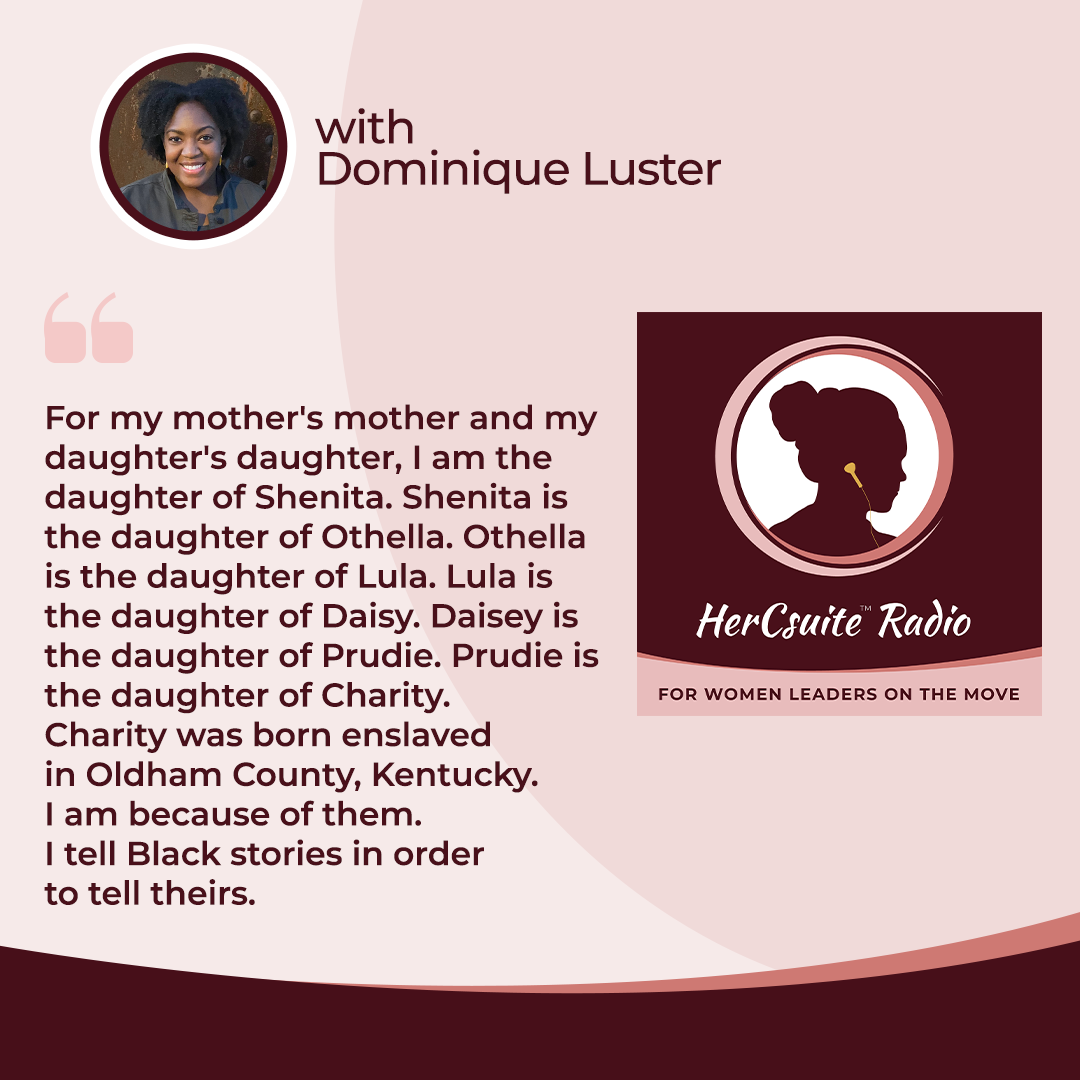
It has included a couple of professional pit stops along the road. A degree here, a Fulbright there. The arc of it is this nerdy little librarian girl from Kentucky who grew up listening to stories at Thanksgiving, Easter, Christmas and all these things. Eventually being able to take that innate piece of myself and shape it into a career and a space where I can help other people learn how stories are created and shaped.
Learn the arc of a story and apply that to their narratives, history and families into the greater collective families of the Black diaspora and the greater collective storytelling of Black women and women from the South. All kinds of these intersections make up our identities and they are often best told through the form of stories. My work gets to help people tie all those pieces together. That's how I would best describe it.
There are so many things that are coming to mind. In particular, you have shared with me something that I'm fascinated by which is our DNA. I'm going to start with that question because that's the question that no one is expecting me to ask. Women don't know what we don't know. When I talked to you, you said to me something so provocative which is we don't know the names of our grandmother's past maybe one generation.
We might know them as great-grandmothers, great-grandmas or what have you. I think about the stories and that might have been how they were referred to as we are sitting around the dinner table and listening to stories of our families. They may never have had their first name used. Can you share a little bit about that, the DNA and all the things?
It's so true. I would challenge the readers to pause and think if you could name both of your grandmothers. We could call that challenge A. Challenge B is can you name all four of your great-grandmothers? Yes or no and it's okay. The real challenge is can you name all eight of your great-grandmothers? As women, we come from a lineage of women. Everyone was born of a woman. For me and my particular family, I can name all the way up to my fifth great-grandmother. Her name is Charity. She's an incredible woman who was born enslaved in Oldham County, Kentucky.
As women, we come from a lineage of women. Everyone was born of a woman. Click To TweetThese Kentucky stories have continued ever since and she was spicy. She didn't take nothing for nobody. I like her a lot. She inspires me because I get to draw strength from her by knowing her name and a bit about her story. What she did was not just her name, birth date and death date. It's more than that. I know a little bit about where she lived, how she lived, the work that she did and her children who became my fourth great-grandmother. I get to learn more about her and the strength that was required of her as a Black woman born enslaved in Kentucky. I got to learn a lot about what she lived through and survived. In her case, thrived through.
For me, in my modern-day life, I find a great sense of strength in her because believe it or not and this goes to the DNA question, I find that there is peace. This little magical piece that's locked into who we are, particularly as women comes from our mother, grandmother and all the women in our line. While there is this squishy soft and magical bit that we can dive into and pull from, there's also some science behind it as well, which I also love. I'm an archivist. I love history but also there's some science behind it.
Things that I am not, a scientist or geneticist and all those things. I'm an archivist but I can share that there is a small part of every woman's DNA that is more or less a carbon copy of our mother. It's a carbon copy of the mother before her. It goes pretty much as far back as our family tree or lineage can go. There are DNA tests that can help do that better than others but it's something that if the readers were interested, they could go and look into. What's fascinating to me about it is that every bit of strength, will, fortitude, humor, life and thriving are locked in there and we could tap into it if we knew her name.
The power of someone's name unlocks four generations of strength for you, for when you feel like you are having a hard time, can't figure something out and you've reached the end of the road or the end of the rope. The fact that you exist as a woman is evidence, truth or fact that all the other women before you somehow were able to figure something out. Maybe not all of it but something out. If you tap into that piece, what can't we do?
I am fascinated by your story of your family and the generations. Knowing the names and taking the pieces, what would you say are some of the things that you learned along the way of those stories? I would love to know a story about your fifth great-grandmother and her fortitude. She didn't take anything from anyone. I love that statement. What was that story like for you that maybe there was a story? First of all, I don't like hearing that was the circumstance that she was born into. I want to be very clear about it. You are half full and see optimism in difficult circumstances. Can you share a story that gives you strength when you need it?
A little bit about Charity, to my knowledge, she was born in Oldham County. Record keeping can get a little fickle. Let me say that is a caveat for any other historians, archivists or anybody else who would read this to the best of my knowledge to the records that I have. She was born in Oldham County, Kentucky a few years before emancipation so she was born enslaved. She lived in that capacity for the majority of her young adult life.
This is the part of the story that is not always as easy but unfortunately, both of her children were separated from her and sold further South. Both were enslaved. The blood of the mother begets the blood of the offspring. Her children, my 4th great-grandmother or 5th great-uncle. I will have to ask a genealogist how that works. They were sold. One was partially further South into a Southern part of Kentucky as the war was approaching and the other was sold much further South into Alabama after emancipation.
A couple of things that if you know, you know. After emancipation and fighting for freedom, Charity went and found her children. I don't know if you've ever walked, driven or ridden through a couple of states but I have no idea how one does that. I have no idea how a Black woman in the late-1860s or early-1870s finds her way that far South to even figure out which land, state and space of what possibly happened to her children.
I don't know if this innate motherly sense, I'm not sure, helped her push through that to find them and bring them back to Kentucky. My fourth great-grandmother, when I first found records of her later in her life, was back in Kentucky reunited as a family. Other things if you know, you know, Charity had Freedmen’s Bureau records as an independent person. She lived by herself raising her children. It was very uncommon for any woman to live by themselves raising their children in the 1870s or the 2020s. It's hard due to inflation but she did it.
She had what I believe is the side step of a bank record, which for anybody who knows, women didn't have the right to vote. White women or Black women, nobody. Women didn't have the right to bank accounts. You could not apply to college without a male signature. There were all these things that all these limits stacked against them and then this intersection of her being a Black woman, a formerly enslaved woman adds onto that but she fought through all of those things.
She put her family back together. She finished raising her children. She had what was a semblance of a bank account. She built a story and made sure that her story was told in the way that she would have wanted it to be remembered, not by the circumstances that were applied to her and that's what is very important about her story.
I'm getting waves of chills from this story, visualizing and talking about how one goes. I'm sure she was maybe on foot or how did she even travel to get to find her children and bring them back? Unbelievable story. Thank you for sharing that because the reason that we do need to know where we come from and this piece of DNA and now I understand why you feel so aligned with that one. Imagine all the obstacles that were in her way and she didn't let anything stop her. She kept going. What an incredible story.
Passing down these stories through your family inspired you to become an archivist which you do. What are some of the things that you are uncovering in the work you are doing that are surprising about stories and how people may not realize what they are uncovering? I can imagine that it's got to be thrilling to discover more information in that way.
It's always a treasure hunt of sorts. You never know what you are going to find or what's on the other side of the box. You never know when you open this folder, drawer or attic of what you are going to find. Sometimes we find things admittedly that give us great joy and strength. Sometimes we find things that give us more questions or pause. In total, to my knowledge, most people never regret the finding. You have to do something with it sometimes or most times but you find and learn. I find that knowing people's names has a profound effect on individuals.
When you know something about your fourth great-grandmother, it changes how you see the world. I don't know how to describe it as well but it changes. Some of the surprising things that come out, particularly in my work with women, are that they often discovered that they are so much stronger than they thought they were or they gave themselves credit for. They were braver than they believed they were. They had capacity beyond what they thought.
Knowing people's names has this profound effect on individuals. When you know something about your fourth great grandmother, it changes how you see the world. Click To TweetIt unlocks something internally. The surprising part is that it has nothing to do with ancestry, history or archival work. It could be a letter that they found from their grandmother or great-grandmother before their great-grandfather went to the war or while they were in the war. Their details or the components gave them personhood or intricacy, this real life. They are not figures or words.
My fourth great-grandmother is not these words. She has a name, story, personality, likes and dislikes. She cooked or hated to cook. She was a real person and you are a real person. When you start putting those two real people together, it does something. It doesn't have anything to do with archives and records selfishly because I love historic archives and records. That's the work that I love, that light bulb when women tap into something. I don't know how else to describe it. When you find someone's name or story, it changes something in you that has nothing to do with the diary or the cookbook that you found
I'm going to share a story about my grandmother whom I was very close to. She was born in 1899. It's hard to imagine, not even in the 1900s but right before. My uncle was telling a story and I heard the story and I was like, “I had no idea this happened.” My mom grew up in the ‘30s and they went to a one-room schoolhouse in rural Wisconsin. Some children didn’t have any food or lunch. I'm imagining one of those metal little lunchboxes you were supposed to bring where people would carry their food.
My uncle and my mom had told my grandmother that there are children that have no food or shoes. It was quite bad and the Depression. My grandmother organized a lunch program in the ‘30s for these children that had no food. This is before lunch. I think about how that translated to my mom and myself to serve first. That piece of DNA when you talk about it, I was like, “Maybe that's where I get it from because she did this thing that she had to make a difference.”
She knew. She wasn't working. She had four children and that was what she was doing but she did this thing and took it upon herself and created this whole system to feed these children that had no food. That was a story that I had no idea and it left an imprint. It’s what you are talking about. When you find that, it does. It rounds things out for you and you get a light bulb moment. You are like, “I get it now.” Now that I have met you, it's like, “I'm going to start thinking of all the things.” I'm so excited.
As I think about what you are looking to do for the future and making an impact on the world around you and the stories, what are some best practices that you do to continue these stories so that people know both your personal and how people should be thinking about sharing that information so that it doesn't get lost?
I do keep a journal and I would encourage other people to do so as well. Even if you are like, “I’m not a journal person,” it's okay. Your great-grandchildren will be so grateful that you were a journal person. One of the things that I have learned or what my research focuses on is the science or the nuances of how history is made. Not that the history route tends to repeat itself, which isn't necessarily true. Humans tend to ebb and flow in similar ways that result in similar causes and effects. Nuance but it's in there.
One of the positive things that I have observed is the stories that we know the most about the stories that get told and the legacy that's built. Legacy and history are these things that help shrink the wealth gap, for example. Wealth is not just finances or money. There's a wealth of knowledge and family. There's a wealth of finances as well. It's a part of it but there's also this wealth of knowing who we are and where we come from. Also, a sense of family, community, history and legacy.
All of these things add up to this large pie that is legacy. That is the knowledge of someone and something if it was an event. That tends to happen to those who wrote it down in the way they wanted it to be remembered, which might not be the way that it happened. I don't know if you've ever had older aunts and uncles or your grandparents where your grandmother may have told you a story about this particular wedding reception.
When you hear your aunt or uncle who was also there tell the same story, it's from their perspective, which might be a little different. If you take that as an example and you envision 50 or 100 years from now, you have to think that at some point, if I wish to be remembered because there is the right to be forgotten, I need to write it down because otherwise somebody else is going to tell that story and it may not be in the way that I would have wanted it told. It may not be from my perspective.
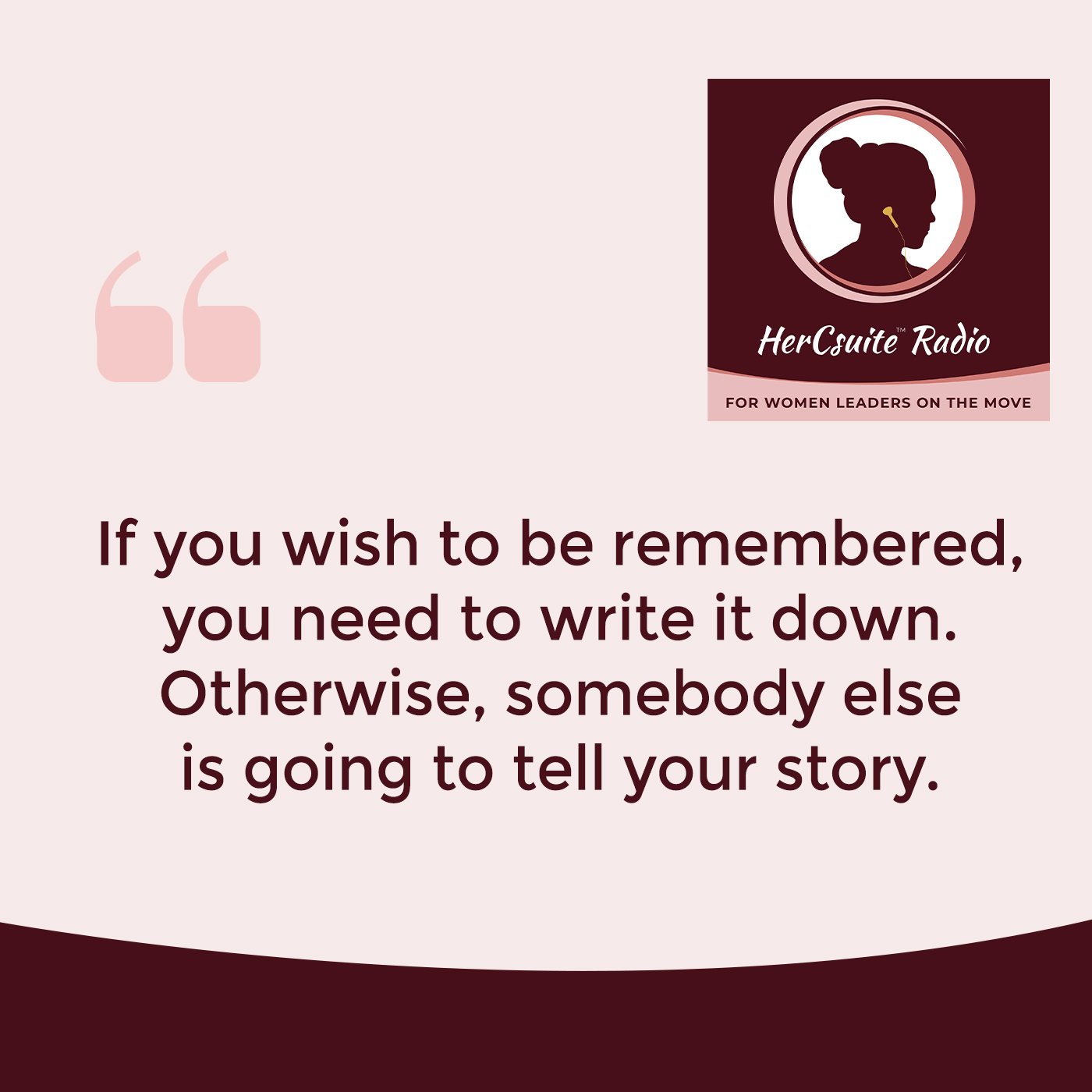


As a shout-out here, women get often erased from history because our names often change in or out of marriages. We can do a whole other episode on that but there's often Mr. and Mrs. male's name. Oftentimes, when you look at family trees, family bibles or these things, you might see Mr. and Mrs. male's names. In newspapers, you'll see Mr. and Mrs. male's names. In programs or sometimes even on degrees, you'll see Mrs. John Smith. I'm not saying that there's anything wrong with that but what I am saying is that our names get lost in that process and not necessarily for the better.
Our individual names. The name that I was born with. The name that I call myself in my mind gets lost. Unless I write that down, keep my journals or diaries and make sure that those get passed somewhere, that name, that who I am can get lost. As we all move through life, I often encourage people to keep a journal. Even if maybe, you are more of a photo person or visual learner, I have encouraged many people to upgrade that cloud capacity on their phones. Take those pictures. Keep a log on your phone and maybe in the notes tab of your phone, whatever works for you.
I know someone who loves cookbooks. No matter if she's going through a phase in life where she's into Ethiopian cuisine, she ends up buying an Ethiopian cookbook. I encouraged her to take notes in the margins of thoughts, changes or tweaks that she makes that are her flavor because then she could pass that cookbook on. You don't have to dear diary. That's not what I'm encouraging. Do what works for you. Make sure you pass it along.
We'll have to have another interview because there are all these questions I have that are popping into my mind. I will end with my mom. You talked about your story being told. My mom was a writer. She was a librarian and she wrote her obituary because she wanted her story, way before she died, to be known like how she wanted to be known and not one of us writing it for her. Being detailed about that information is such an inspiration. I have so enjoyed this conversation. For people that want to learn more about you and the amazing things you are doing, where should they go to find you?
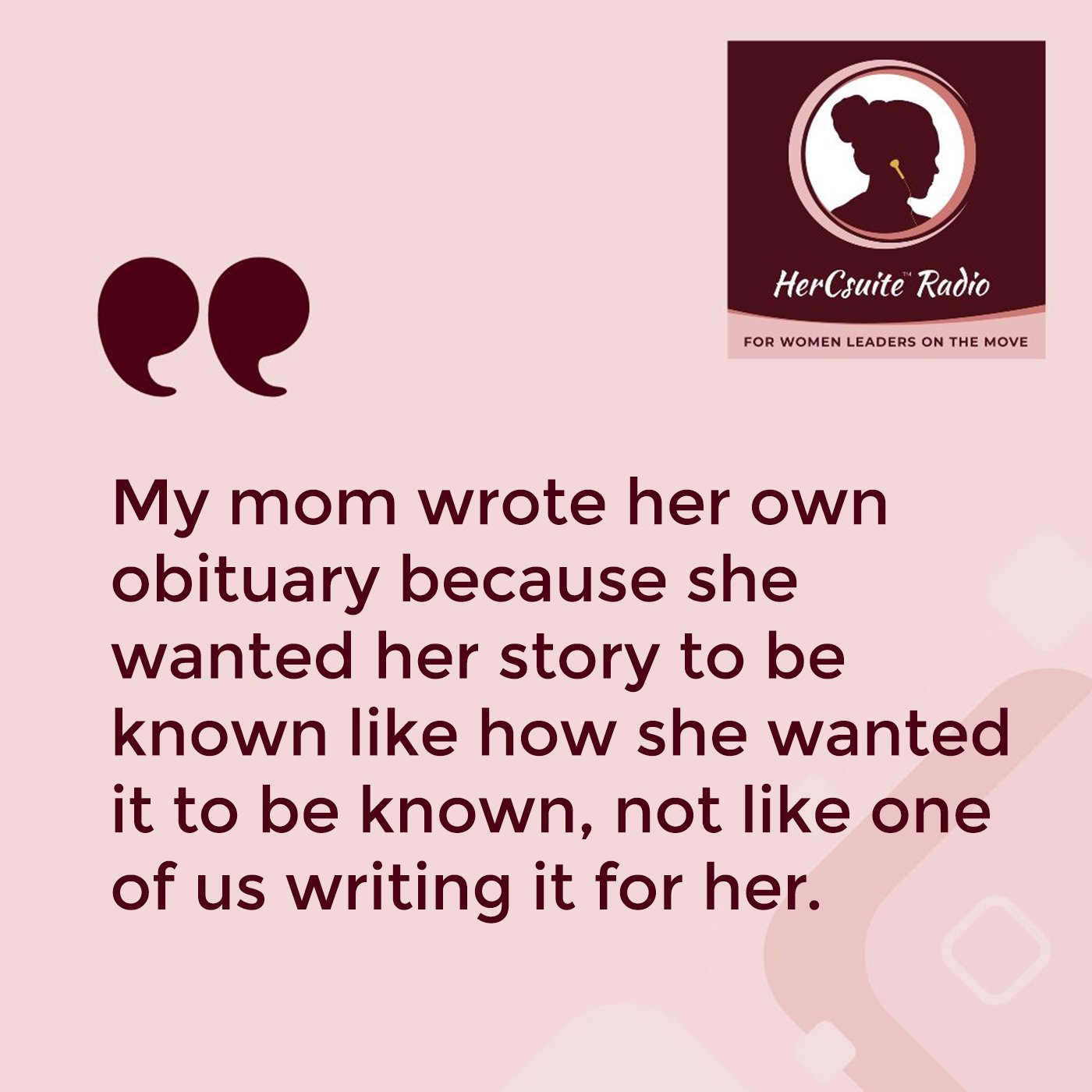


I might recommend that in the future, the obituary. That's brilliant. I never thought of that. Thank you for having me. This has been an incredible conversation. I'm so grateful to be here. If anyone's ever interested, I can always be found at TheLusterCompany.com or on Instagram @TheLusterCompany. If you would like to connect with me on Twitter, I don't recommend it. I'm never on there. The company is on there. I don't know how to tweet. I don't know how to use it.
I'm so glad. Shout-out to Bobbie Carlton in Innovation Women that I found you there. It's been an amazing experience having this conversation. Thank you, Dominique, for being here and inspiring us all to tell stories in a way that is remembered by the way we want to have them remembered. Thank you for sharing that.
Thank you so much.
Important Links
- Dominique Luster
- @TheLusterCompany
- Innovation Women
- https://YouTu.be/XsNPlBBi1IE – Archives Have the Power to Boost Marginalized Voices | Dominique Luster | TEDxPittsburgh
About Dominique Luster
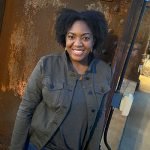


Natalie Benamou
Founder, CEO
HerPower2, Inc, | CGO HerCsuite™ | Podcast Host HerCsuite™
Natalie founded Herpower2, inc. to create products under HerCsuite™ to empower women to make a lasting impact today and into the future. She takes a ‘serve first’ approach to life and has applied this principle throughout her career, serving in leadership positions in business as well as non-profit organizations.
Share this story:
HerCsuite® is an official product of HerPower2 Inc. | all rights reserved – Privacy Policy – Terms & Conditions

